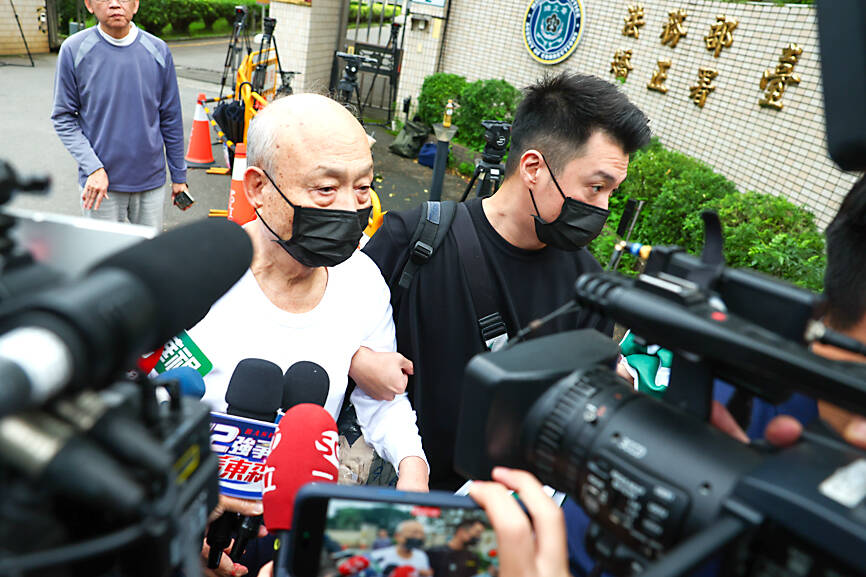Former Dingyue Development Corp president Chu Yea-hu (朱亞虎) was released on bail yesterday by the Taipei District Court after prosecutors said he confessed amid an investigation into Core Pacific Group and the former Taipei administration.
Chu is among the 22 people listed as defendants in an investigation into alleged corruption involving Taiwan People’s Party Chairman Ko Wen-je (柯文哲).
Chu faces charges of bribery and other contraventions of the Anti-Corruption Act (貪污治罪條例) and the Criminal Code.

Photo: CNA
Prosecutors said that in 2021 he played an intermediary role while he was president of Dingyue Development, a subsidiary of Core Pacific Group, which is owned by Sheen Ching-jing (沈慶京).
The allegations stem from the alleged conduct of executives of the firms and officials of the Ko administration when he was Taipei mayor over the Core Pacific Living Mall redevelopment project.
Ko has been in detention since Sept. 5 as prosecutors investigate alleged preferential treatment given to Core Pacific Group.
Investigators said that Chu bribed Taipei City Government and other officials to derive financial benefits for his company totaling about NT$40 billion (US$1.23 billion).
Taipei City Councilor Chien Shu-pei (簡舒培) has accused Dingyue of buying plots of land for the mall in 2019 from Core Pacific Group for NT$37.2 billion to start the redevelopment process.
Taipei Urban Planning Commission documents showed that Dingyue and Core Pacific Group representatives in 2021 met with city officials during negotiations over the project, during which the floor area ratio was increased from 392 percent to 560 percent, 720 percent and finally 840 percent, investigators said.
Prosecutors yesterday filed a request to release Chu on NT$2 million (US$61,636) bail, saying that he had confessed and provided testimony. The court approved the request.
Chu acknowledged having received instructions from Sheen to pass on money in exchange for the increased floor area ratios, prosecutors said.
Chu is the only one of the defendants to have confessed so far, they said.

US President Donald Trump said "it’s up to" Chinese President Xi Jinping (習近平) what China does on Taiwan, but that he would be "very unhappy" with a change in the "status quo," the New York Times said in an interview published yesterday. Xi "considers it to be a part of China, and that’s up to him what he’s going to be doing," Trump told the newspaper on Wednesday. "But I’ve expressed to him that I would be very unhappy if he did that, and I don’t think he’ll do that," he added. "I hope he doesn’t do that." Trump made the comments in

NOT AN OPENING: Trump’s violation of international law does not affect China’s consideration in attacking Taiwan; Beijing lacks capability, not precedent, an official said Taiwanese officials see the US’ capture of the president of Venezuela as a powerful deterrent to Beijing’s aggression and a timely reminder of the US’ ability to defeat militaries equipped with Chinese-made weapons. The strikes that toppled Venezuelan President Nicolas Maduro signaled to authoritarian leaders, including Chinese President Xi Jinping (習近平), US President Donald Trump’s willingness to use military might for international affairs core to US interests, one senior official in Taipei’s security circle said. That reassured Taiwan, the person said. Taipei has also dismissed the idea that Trump’s apparent violation of international law could embolden Beijing, said the official, who was not

A cold surge advisory was today issued for 18 cities and counties across Taiwan, with temperatures of below 10°C forecast during the day and into tonight, the Central Weather Administration (CWA) said. New Taipei City, Taipei, Taoyuan and Hsinchu, Miaoli and Yilan counties are expected to experience sustained temperatures of 10°C or lower, the CWA said. Temperatures are likely to temporarily drop below 10°C in most other areas, except Taitung, Pingtung, Penghu and Lienchiang (Matsu) counties, CWA data showed. The cold weather is being caused by a strong continental cold air mass, combined with radiative cooling, a process in which heat escapes from

Snow this morning fell on Alishan for the first time in seven years, as a strong continental cold air mass sent temperatures plunging across Taiwan, the Central Weather Administration (CWA) said. The Alishan weather station, located at an elevation of about 2,200m in central Taiwan, recorded snowfall from 8:55am to 9:15am, when the temperature dropped to about 1°C, the CWA said. With increased moisture and low temperatures in the high-altitude Alishan area, the conditions were favorable for snow, CWA forecaster Tsai Yi-chi (蔡伊其) said. The last time snow fell at the Alishan weather station was on Jan. 10, 2018, while graupel fell there